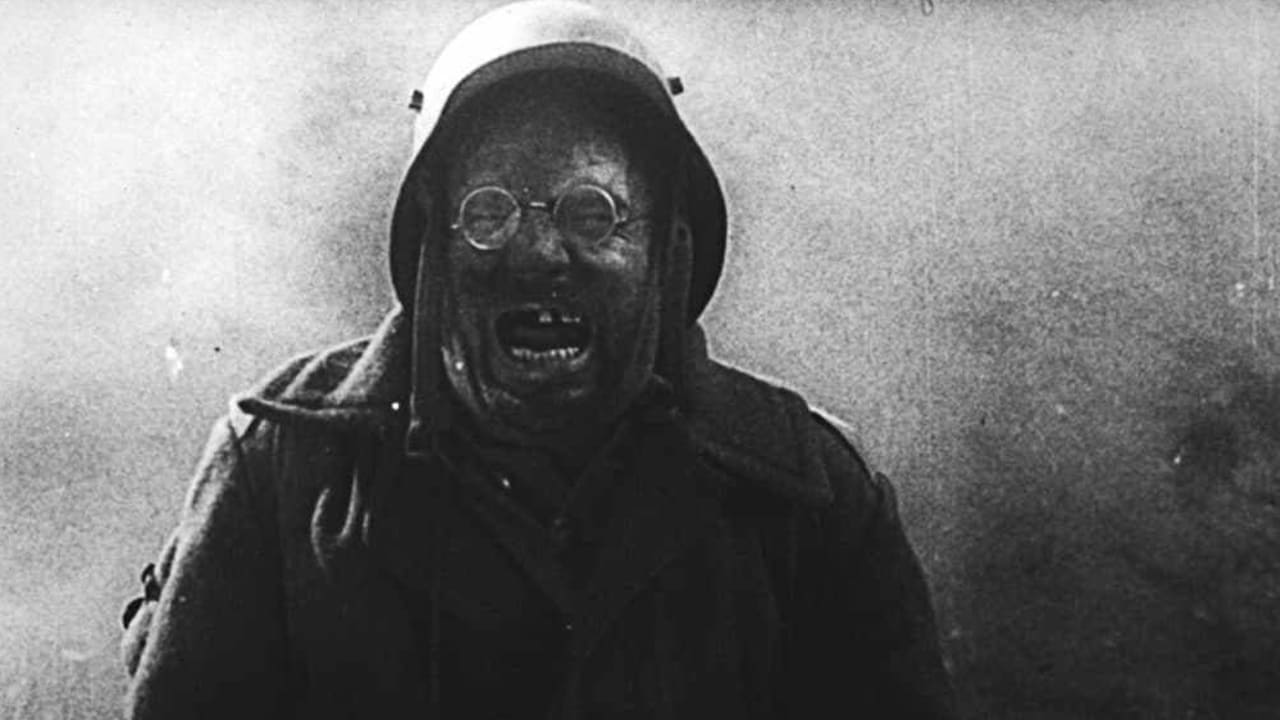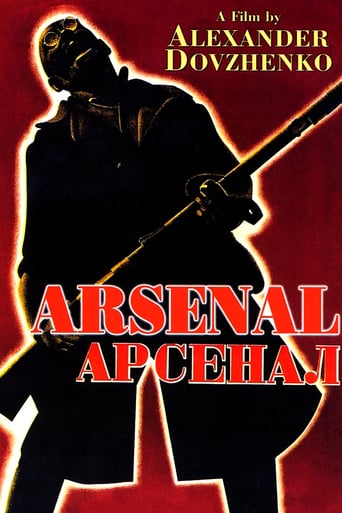

It goes without saying that silent cinema requires emphasis on the imagery. Alexander Dovzhenko's "Arsenal" is no exception. The look back at World War I over the past year should draw attention to this movie. Like Lewis Milestone's "All Quiet on the Western Front", this movie looks at the futility of war. The focus in the Kiev Arsenal January Uprising in 1918. Probably the most effective scene is the laughing gas: a man artificially laughs while surrounded by all manner of horror, a perfect metaphor for the disconnect between the image and reality of war.The only other Dovzhenko movie that I've seen is "Earth". I understand that "Arsenal" and "Earth" are the second and third installments of his Ukraine Trilogy. I'll have to see "Zvenigora", as well as the rest of Dovzhenko's movies. Despite the obvious propaganda, this is still a movie that you have to see just for the imagery if nothing else. Like Sergei Eisenstein's "Battleship Potemkin", it contains some of the most unforgettable images in cinema history. Definitely see it.
... View MoreIt boggles the mind to contemplate how far back was cinema set with the advent of sound; not sound per se, but the whole political environment that was concurrent at the time. So many fascinating experiments with film were afoot by the late 20's and would be put on hold for the next twenty, thirty years.With DW Griffith ten years before, cinema was a transliteration. The narrative was straight-forward, time, even when broken apart, was a straight line that rushed towards climax that revealed our placement in destiny, the chain of causality was clearly defined - this begat that, and we perfectly understood why. Film was merely a tool of chronicle, with the gods - the mechanisms above - and shadows - the internal image outwardly recast - largely taken out.But just ten years later, something like this was already so far ahead. So, the causality of events is left to our sphere of imagination, narrative is fragmented, purposely eliptic into modernist abstraction. Images require our folding in them to be complete with meaning, or channel their imports across different levels of experience; there is a scene of men rushing on horses to bury their comrade, they could be rushing into a number of things; and back at the weapons foundry where a strike is holding up, eloquent shots of machinery whirring in motion suggest afoot the social machinations at large. Life here is not passed down to us whole, with purpose or meaning; but is rather the process of coming into being.This is far-reaching stuff in terms of what can be done with cinema. It posits that the image can directly depict private, inner states and larger, collective worlds as bound together by common soul - the oppressed peasants motionless like zombies, the military officer mechanically shooting at partisans. The shots of galloping horses are frenzied, but up above the clouded skies ebb with time. So, what started only a couple of years before in Soviet studios had reached this apex; image was engineered - or perhaps intuited in the case of Dovzhenko, who was the least of the theorists - to unify vision. The empire is inland as well as out, and stretches across the one space.There are few words in all of this, our safe passage with logic is made perilous, adventuresome. Germanic cinema offered us the world of noir and I am grateful to them; but when it comes to what we often call 'pure cinema' as a quick resort, they could not match here - or France.Oh, there is The Last Laugh, which is a marvellous study. But purely in terms of images Dovzhenko is worth two or three of those.
... View MoreFor several years I had a decent quality print on video and was always fascinated by this film. Very few motion pictures are as visually striking and intense, but little of the story came through. I just purchased the DVD and the audio commentary track by Vance Kepley really illuminated "Arsenal". Undoubtedly the finest commentary I've yet heard. If this classic movie isn't your cup of tea, get the DVD anyway. Dovzhenko was an artist like few others. His work really deserves rediscovery; hopefully future releases of "Zvenigora", "Earth" and "Aerograd" will have Kepley's commentary as well. But even as they are, Dovzhenko's films are truly essential.
... View MoreAnother montage crazy film by the Russians here. Instead of Eisenstein laying it on thick, we have Alexander Dovzshenko getting into the act with 'Arsenal'. A film about, yes, the oppression of the people against the state! Instead of the Russians, this time we the Ukrainians becoming oppressed. Mainly set in a arsenal factory (!!) the people fight the threat of Government interference! Set to a frenetic score, Arsenal sure must have kept the editors busy with many crazy jump cuts going at a frenetic pace. What does it all mean? Not 100% sure, as some of the obvious symbolism just flew right by me. It's an OK movie if you're into that sort of stuff. (You know who you are).
... View More